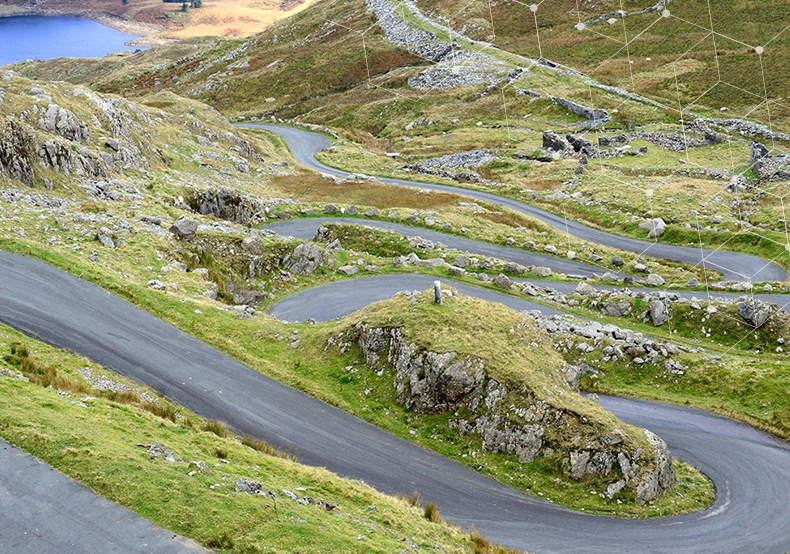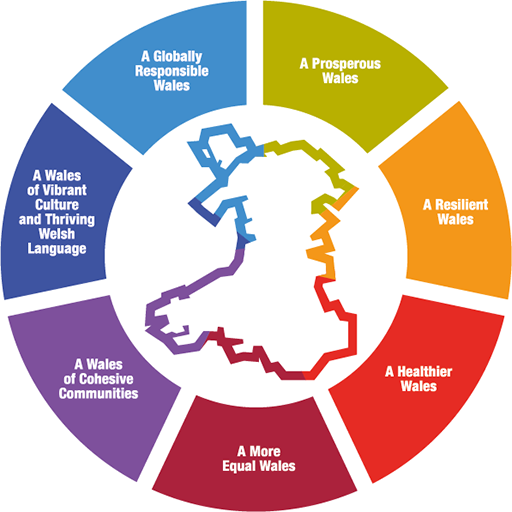1.2 The Well-being of Future Generations (Wales) Act 2015
In the UK, the most developed approach to reducing carbon emissions is the Well-being of Future Generations (Wales) Act 2015 [Tip: hold Ctrl and click a link to open it in a new tab. (Hide tip)] (Future Generations Commissioner for Wales, n.d.a). It is seen as a world leading approach to protecting future generations and addressing climate change.
The seven wellbeing goals
To ensure that Wales is working towards the same shared purpose and vision, the Act has seven wellbeing goals that all public bodies must work towards achieving. These are outlined in Figure 4 and explained in Table 1.
A Prosperous Wales An innovative, productive, and low carbon society that recognises the limits of the global environment and therefore uses resources efficiently and proportionately (including acting on climate change); and which develops a skilled and well-educated population in an economy that generates wealth and provides employment opportunities, allowing people to take advantage of the wealth generated through securing decent work. |
|
A Resilient Wales A nation which maintains and enhances a biodiverse natural environment with healthy functioning ecosystems that support social, economic and ecological resilience and the capacity to adapt to change. |
|
A More Equal Wales A society that enables people to fulfil their potential no matter what their background or circumstances (including their socio-economic circumstances). |
|
A Healthier Wales A society in which people’s physical and mental wellbeing is maximised and in which choices and behaviours that benefit future health are understood. |
|
A Wales of Cohesive Communities Attractive, safe, viable and well-connected. |
|
A Wales of Vibrant Culture and Thriving Welsh Language A society that promotes and protects culture, heritage, and the Welsh language, and which encourages people to participate in the arts, and sports and recreation. |
|
A Globally Responsible Wales A nation which, when doing anything to improve the economic, social, environmental and cultural wellbeing of Wales, takes account of whether doing such a thing may make a positive contribution to global wellbeing. |
The Act has a strong focus on how the goals will be achieved by encouraging public bodies and organisations to use sustainable development principles of long-term, prevention, integration, collaboration, and involvement, as depicted in Table 2 below.
Long-term: The importance of balancing short-term needs with the needs to safeguard the ability to also meet long-term needs. |
|
Integration: Considering how the public body’s wellbeing objectives may impact upon each of the wellbeing goals, on their objectives, or on the objectives of other public bodies. |
|
Involvement: The importance of involving people with an interest in achieving the wellbeing goals, and ensuring that those people reflect the diversity of the area which the body serves. |
|
Collaboration: Acting in collaboration with any other person (or different parts of the body itself) that could help the body to meet its wellbeing objectives. |
|
Prevention: How acting to prevent problems occurring or getting worse may help public bodies meet their objectives. |
Activity 3 Thinking about the possibilities for higher education institutions
In the video below, Scott Stonham, Independent Sustainable Technology Analyst and author, shares the role higher education institutions (HEIs) could play in the future.
As you watch the video make a note of the following:
- the strengths within your own organisation
- areas that are of interest to you
- how you might be able to make a difference in the future.

Transcript: Video 3 HEIs for the future
Feedback
Scott Stonham is the author of the Jisc report Exploring digital carbon footprints (Soneham, 2022), which focuses on the hidden environmental cost of the digital revolution and the steps universities and colleges can take. Feel free to download and read the report in your own time.

